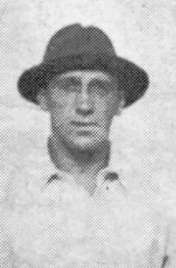José María Belauste
 Belauste in 1920 | ||
| Medal record | ||
|---|---|---|
| Men's football | ||
| Representing | ||
| Olympic Games | ||
| | 1920 Antwerp | Team competition |
José María de Belausteguigoitia Landaluce (3 September 1889 – 4 September 1964), known as Belauste, was a Spanish footballer who played as a midfielder.
Football career
Born in Bilbao, Biscay, Belauste played with Athletic Bilbao from ages 15–36. His game was based on a physical display, as he stood at 1.93 meters and weighed 95 kilograms. He made his debut for his only club on 4 April 1909 in a 2–4 loss against Club Ciclista de San Sebastián, and won six Copa del Rey trophies during his tenure.[1][2]
Belauste gained three caps for Spain, representing the nation at the 1920 Summer Olympics in Belgium and helping it win silver, as captain. His debut came during the tournament in a 1–0 win against Denmark, and in the second game, against Sweden, he was immortalized in the annals of Spanish football: in the play that led to the 1–1 equalizer, he reportedly shouted to teammate Sabino Bilbao: "¡A mí el pelotón, Sabino, que los arrollo!" ("Send me that ball, Sabino, i'll crush them!" in Spanish).[3] This was subsequently viewed as the reason why the national team was dubbed Furia Roja (Spanish Fury).[1]
Personal life / Death
Belauste was one of nine children born to a middle-class family. He majored in law from the University of Deusto while still an active player, and later worked as a lawyer.
Belauste was also active in politics, being affiliated to the Basque Nationalist Party and responsible for its sports section. During a meeting in 1922, he shouted "Death to Spain!"; additionally, he almost did not receive his Olympic medal, due to the fact he refused to carry the Spanish flag in the parade.
After his voluntary exile, first to France, then Algeria, Argentina and Brazil, Belauste returned home, but left for Mexico after the start of the Spanish Civil War. He died on 4 September 1964 in Mexico City at the age of 75, from lung cancer.[1]
Honours
Club
- Copa del Rey: 1911, 1914, 1915, 1916, 1921, 1923
- Campeonato Norte: 1913–14, 1914–15, 1915–16
- Campeonato de Vicaya: 1919–20, 1920–21
Country
References
- 1 2 3 El inspirador de la "furia española" fue un vasco (The inspirer of the "Spanish fury" was a Basque); El Mundo, 15 June 2008 (Spanish)
- ↑ "Leyendas del Athletic Club de Bilbao – 'Belauste'" [Athletic Club de Bilbao legends – 'Belauste'] (in Spanish). El Correo. Retrieved 23 May 2016.
- ↑ Algo más que un grito (More than a cry); El País, 23 December 2005 (Spanish)
- "José María Belauste". Olympics at Sports-Reference.com. Sports Reference LLC.
External links
- José María Belauste profile at BDFutbol
- José María Belauste at National-Football-Teams.com
- José María Belauste – FIFA competition record
- Spain stats at Eu-Football